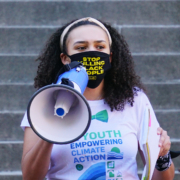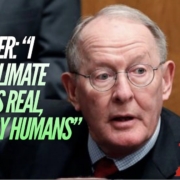Students at Vanderbilt University hold Protest to Divest from Fossil Fuels
By Connor Warmuth, DivestVU Executive | ([email protected])
“Hey, hey! Ho, ho! Fossil fuels have got to go!”
Over thirty student protesters chanted these words as they marched from the campus Central Library to Kirkland Hall at Vanderbilt University. The protest was designed to get the administration to seriously consider divestment of the university’s endowment from fossil fuels.
Fossil fuels are significant drivers of climate change. The release of carbon dioxide and methane from fossil fuel combustion, exacerbates the Greenhouse Effect, resulting in increased absorption of heat and higher average temperatures globally. Warmer temperatures will mean more extreme weather events, a climate refugee crisis, increased likelihood of famine, reduced water capacity, mass extinction of ecosystems, and exacerbated global inequities. 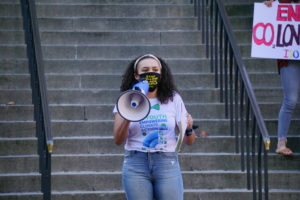
Furthermore, particulates and chemicals released at all stages of fossil fuel extraction and consumption pollute the Earth’s atmosphere, water, ecosystems. Pollution from fossil fuels directly results in a variety of serious health issues from asthma to cancer, particularly in minority communities. Pollution causes nearly 400,000 deaths per year.
So how much of the endowment is actually invested in fossil fuels? According to the 2020 Financial Report, four percent of Vanderbilt’s 6.9 billion dollar endowment is invested in “natural resources.” These investments are in “timber, oil and gas production, mining, energy, and related services businesses.” While the endowment supports a large portion of the students attending Vanderbilt, many question the idea of receiving financial aid from fossil fuel investments. As environmental justice advocate Luis Martínez puts it,
“I feel morally opposed to having any monetary assistance I received for my education be sourced from fossil fuel investments, particularly in light of the education my own school gives me to clearly know the urgency of climate change in our lives. Our university education is a gift to effect change.”
The university has ignored support for divestment, despite the passage of resolutions favoring divestment in the Graduate Student Council (GSC) and the Vanderbilt Student Government (VSG), and the accumulation of 1100 student signatures in an online petition. According to Emily Irigoyen, leader of DivestVU, a coalition of students advocating for divestment of the endowment of fossil fuels,
“The administration has not engaged with our divestment campaign and has ignored our attempts to reach out to high ranking officials in the endowment office.”
As a result, DivestVU, DoresDivest (a separate coalition of students advocating for divestment), and several other student-run university organizations agreed to host a protest.
“Unfortunately, climate change is too pressing of an issue to sit out on the sidelines–so we took action.” said Miguel Moravec of DoresDivest.
At the protest, students marched while holding up posters with messages reading “Divest Vandy Now,” “Anchor Down DivestVU,” and “You are on Native Land.” The protest even featured a giant fourteen-foot unicorn with the words “Divest Fossil Fuels” written on the side.
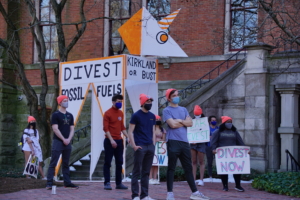
Finally, the protesters arrived at the steps of Kirkland Hall, the tall, brown building with a clock at the top, where many of the leaders in the Vanderbilt administration work. Each protester wore a mask and stood six feet apart to prevent the spread of COVID-19. Representatives from multiple campus organizations delivered speeches in favor of divestment.
Speaker Luis Martínez urged the Vanderbilt community to join him in calling for the university to divest from fossil fuels. Born and raised in Miami, Florida by a Cuban father and a Venezuelan mother, he has witnessed firsthand the disproportionate effects of climate change from tropical cyclones, rising sea levels, and heatwaves on Black and brown communities.
“There is no place I love more in the world and I will do the best I can in this life to protect the communities it holds from the worst impacts of Anthropogenic climate change.”
Next, Emily Irigoyen acknowledged that Vanderbilt occupies the traditional lands of the Cherokee, Shawnee, Choctaw, Chickasaw, and Creek peoples.
“By offering this Land Acknowledgement, we affirm indigenous sovereignty and will work to hold Vanderbilt University more accountable to the needs of American Indian and indigenous peoples.”
Ana Fonongava’inga and Gabby Guarna of Vanderbilt’s Indigenous Scholars Organization added that:
“By continuing to invest in fossil fuels, the university is complicit in the destruction of our ancestral lands in the South Pacific, the destruction of Native lands here on Turtle Island due to toxic pipelines, the perpetuation of the Missing and Murdered Indigenous Women and Girls crisis, the displacement of our relatives, and the attack on Indigenous futures and wellbeing globally.”
Emma Tharpe, co-president of Hidden Dores, spoke out about white supremacy at Vanderbilt:
“Despite the fact that climate change is already disproportionately impacting communities of color, the refusal [to divest] from institutions [like Vanderbilt] who claim to value their “minority” populations, and who have things like “perspectives” requirements to graduate, and more Instagram posts and pamphlet photos of Black and brown students than I could count is persistent. This is absolutely hypocritical.”
Finally, DoresDivest’s Ben Hayden and Miguel Moravec, DivestVU’s Hannah Bruns, and VSG’s Vice President Shun Ahmed shamed the Vanderbilt administration for their complete lack of morality:
“Investment decisions [made by Vanderbilt], like all other decisions, are moral decisions. And divorcing the two, and putting on blinders to all other effects of your decision making, is both a categorical mistake and a moral blunder,” Hayden said.
Bruns added,
“It’s embarrassing that we have to ask our own university to invest in our futures by divesting from fossil fuels.”
Ahmed said,
“Vanderbilt [needs] to realize that their students will not be quiet and sit in a meeting room and just watch these issues continue on.”
Looking to the future, Irigoyen hopes the university will be more engaged in the movement to divest from fossil fuels:
“The administration has to show a good faith effort in discussing fossil fuel divestment and the creation of an ethical divestment committee with student representatives. If they don’t we will be forced to escalate our disruptions until they listen to us. The University relies heavily on alumni donations and targeting alumni who care about climate change to withhold donations is a potential next step.”
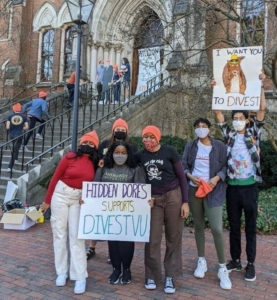
Thanks for reading! We’re an independent, reader-supported site that depends entirely on you to help us keep holding our public officials accountable and “Yelling the Truth”, so please consider chipping in a $3, $5, or $10 monthly and we’ll keep telling the stories nobody else will:

